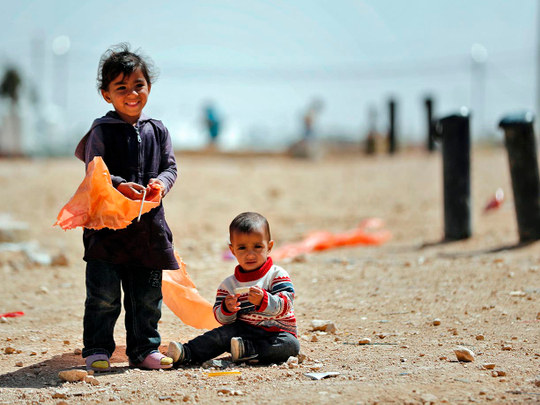
Beirut: More than five million Syrians are now refugees, the UN said Thursday, as aid groups urged the international community to end the country’s six-year war and provide more assistance.
The new figures mean around a quarter of Syria’s population has fled since the March 2011 start of a conflict that has killed over 320,000 people.
The UN refugee agency urged more international assistance, with spokeswoman Cecile Pouilly calling the figure an “important milestone”.
“As the number of men, women and children fleeing six years of war in Syria passes the five million mark, the international community needs to do more to help them,” said the UNHCR.
Aid groups helping Syrian refugees have regularly sounded the alarm about the crisis, appealing for more funds and international action to end Syria’s war.
“It’s clear that the international community has completely failed to end the conflict in Syria,” said Alun McDonald of Save the Children.
“The situation inside the country is still not remotely safe for people to go home, we see more people being uprooted every day.”
McDonald said much of the international community was also failing refugees, increasingly closing borders and turning them away.
Most Syrian refugees are hosted regionally, by neighbours Turkey, Lebanon and Jordan, with more in Iraq and Egypt.
Largest group in Turkey
Hundreds of thousands of Syrians have also fled to Europe, often risking exploitation by smugglers and even death on arduous journeys by land and sea.
Smaller numbers have been resettled officially in Europe, Canada and the United States, though President Donald Trump’s administration has sought to temporarily halt all Syrian refugee entries.
The largest group is in Turkey, with over 2.9 million registered Syrian refugees, according to the UN.
Less than a tenth reside in camps, with most living in Turkish cities, including more than half a million in Istanbul alone.
President Recep Tayyip Erdogan, an early backer of the Syrian uprising who repeatedly urged President Bashar Al Assad to step down, has even floated the possibility of granting some refugees citizenship.
In Jordan, some 657,000 Syrian refugees are registered with the UN, but the government says the true figure is 1.3 million.
Tens of thousands of Syrians live in two large camps, Zaatari and Azraq, but the majority live in homes and apartments, able to access the job market but competing for scarce employment.
The situation is more complicated in Lebanon, where the government refused the establishment of formal camps.
The UN says around one million Syrians are in the country, though the government says the figure is higher, with many living in dismal conditions in informal camps.
Impact on children
Lebanon has just four million citizens and was already struggling with limited resources, unemployment and overstretched infrastructure before the refugee influx.
In a joint statement with Syrian organisations, charity Oxfam urged more support for host countries.
“Oxfam calls on rich countries to show their support for Syria’s neighbours that have welcomed these refugees and to resettle at least the most vulnerable 10 percent most of Syrian refugees by the end of 2017,” said Oxfam international executive director Winnie Byanyima.
“It’s a protracted crisis and the funding is not catching up with the needs,” added Oxfam spokeswoman Joelle Bassoul.
Tom Garofalo, a regional director of the International Rescue Committee (IRC) which responds to humanitarian crises around the world, urged the EU-UN conference on Syria being held next week in Brussels to focus on efforts to bring the conflict to an end.
“It is vital they remember that this war isn’t over yet; the intensity of the conflict is still forcing 6,000 people to flee their homes every day,” he said.
“Now is not the time to talk about post-conflict reconstruction or returning refugees. Until the fighting ends, Syrians have no reason to hope for a better future for their country.”
Aid groups and the UN have also regularly warned about the long-term impact of the crisis, particularly on children.
“A million Syrian refugee children are out of school and missing out on education, and they are the ones who will have to contribute to rebuilding Syria for the next generation,” said Save The Children’s McDonald.











